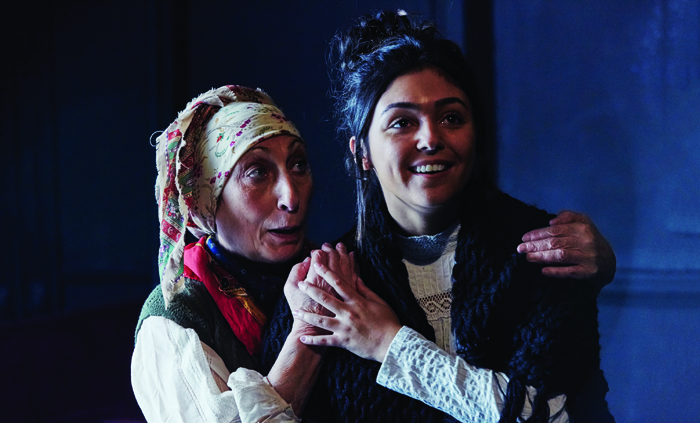 What do The Dybbuk, The Golem and Fiddler on the Roof have in common? Their stories were all originally written in Yiddish. From Franz Kafka to Danny Kaye, the influence of Yiddish theatre is far reaching. Four years before the first professional production in Yiddish took place in a Romanian wine garden in 1876, one of its most influential writers, David Pinski, was born into a cosmopolitan Jewish family in Mohilev, Russia (now Belarus). He moved to Warsaw, Switzerland, Vienna and Berlin before emigrating to New York in 1899, where he lived for 50 years. While there he was an active member of Jewish cultural and political life and was president of the Jewish National Workers’ Alliance from 1920-22, and president of the Jewish Culture Society from 1930-53. Finally, in 1949, the committed left-wing Zionist moved to Israel, where he lived until his death in 1959.
What do The Dybbuk, The Golem and Fiddler on the Roof have in common? Their stories were all originally written in Yiddish. From Franz Kafka to Danny Kaye, the influence of Yiddish theatre is far reaching. Four years before the first professional production in Yiddish took place in a Romanian wine garden in 1876, one of its most influential writers, David Pinski, was born into a cosmopolitan Jewish family in Mohilev, Russia (now Belarus). He moved to Warsaw, Switzerland, Vienna and Berlin before emigrating to New York in 1899, where he lived for 50 years. While there he was an active member of Jewish cultural and political life and was president of the Jewish National Workers’ Alliance from 1920-22, and president of the Jewish Culture Society from 1930-53. Finally, in 1949, the committed left-wing Zionist moved to Israel, where he lived until his death in 1959.
Pinski wrote over 60 plays and there were novels too. His subject matter ranged from stories of the lives, struggles and dreams of the ordinary Jewish folk to Biblical themes, including both King David and King Solomon, their wives, and the coming of a future Messiah.
Treasure is arguably his comic masterpiece, revived here in a brand new adaptation by Colin Chambers. The play premiered in 1912 and remained popular in the Yiddish repertoire until the 1940s (with a production in the Vilna Ghetto in 1943), was staged in German by Max Reinhardt in 1919 and in English on Broadway in 1920. The story follows poor gravedigger’s daughter Tille, who must decide whether or not to keep a pile of gold coins her brother finds at the graveyard. Should she hand it in and remain in a life of drudgery or use it to turn her world around?
Its latest incarnation in a production at London’s Finborough Theatre is directed by Alice Malin. What drew her to Pinski’s comedy? “It’s a story of female emancipation and it has real wow factor. Tille seeks freedom by using found money for her own ends and that wowed me. Plus it’s resonant today in how humanely it treats poverty and approaches the subject of inequality. Its dirt poor protagonists are united by the same goals, being free and visible and having enough money to live. It’s really funny and outrageous, part farce, part tragedy.” Not to give too much away, as occupants of the graveyard come to life, it sounds as if Pinski’s story is magic realism. Alice agrees and adds that it’s “a strange surreal expressionist drama, judiciously nipped and tucked by Colin Chambers.”
Malin is confident the audience will share her enchantment with the “wry, witty heroine with chutzpah". She explains that "Tille is in her late teens and so poor that she has no prospects of marriage till her brother finds the treasure. She takes a massive gamble and going on the journey of its consequences is really intoxicating . She takes a massive punt buying clothes to make herself look genuinely rich so that potential husbands will consider her – not because she is vain and wants to look pretty, but to seize the chance of a better life. The whole community, especially the traditional menfolk, descend on the graveyard and demand that she be put back in her place, but she refuses and manages to keep one step ahead of them. Her mother Jachne Braine is constantly coming back with sarcastic comments, on the one hand terrified of the money and everyone wanting something from her, but on the other overwhelmed by the possibilities. The production boasts a cast of 15, with three Jewish cast members – Olivia Bernstone as Tille, Fiz Marcus as Jachne and Felicity Davidson as a town gossip. Malin assures that there will be dancing too, because “klezmer music and dance is really important.”
Treasure runs from Tuesday 20 October to Saturday 14 November. Finborough Theatre, 118 Finborough Rd, SW10 9ED; 0844 847 1652. www.finboroughtheatre.co.uk
